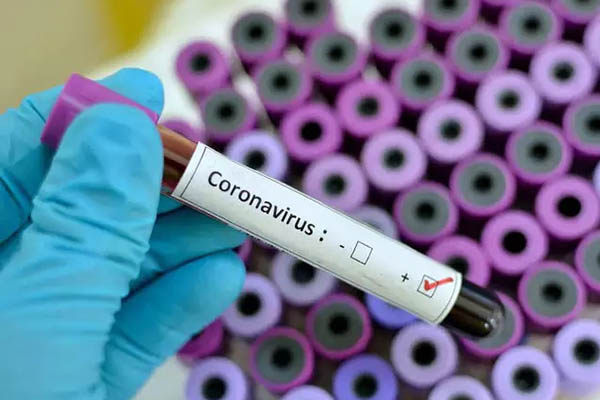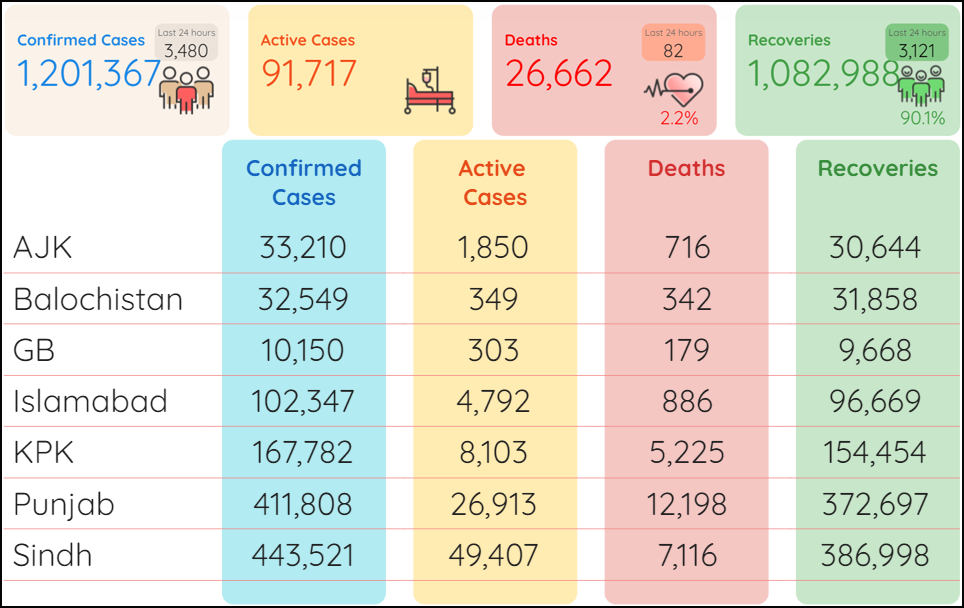
File photo
Confirmed infections of COVID-19 reach 1,201,367, against 1,082,988 recoveries and 26,662 deaths, leaving 91,717 active cases
Pakistan on Saturday reported 3,480 new infections of COVID-19 after conducting 63,181 tests—a positivity ratio of 5.5 percent.
Planning Minister Asad Umar on Friday announced that over 20 million Pakistanis had thus far been fully vaccinated against the coronavirus. “In the early days of the vaccination campaign, we had set a daunting target of vaccinating [70 million] people by the end of this year,” he posted on Twitter. “Happy to report that [50 million] people have now received at least 1 dose. More than [20 million] fully vaccinated,” he said, adding that authorities now hoped to not only meet, but also surpass the target it had set for itself.
Confirmed Cases, Total – 1,201,367 (Tests: 18,410,778)
Punjab – 411,808
Sindh – 443,521
Balochistan – 32,549
Khyber-Pakhtunkhwa – 167,782
Islamabad – 102,347
Gilgit-Baltistan – 10,150
Pakistan-administered Kashmir – 33,210
Deaths – 26,662
Recoveries – 1,082,988
In the 24 hours preceding 8 a.m., Saturday, Pakistan’s confirmed cases climbed to 1,201,367. Meanwhile, deaths increased by 82 to 26,662. At the same time, recoveries increased by 3,121 to 1,082,988, or 90.1 percent of total infections. There are currently 91,717 active cases of COVID-19 in the country, with the NCOC saying 5,373 of them require critical care.

Punjab
On Saturday, authorities reported 27 deaths due to the coronavirus, raising total casualties to 12,198. The province now has 411,808 confirmed cases; it reported 1,345 new infections after conducting 21,474 tests, a positivity ratio of 6.3 percent. There were 1,036 new recoveries recorded, leaving 372,697 fully recovered, and 26,913 active cases of the virus.
Sindh
Confirmed cases of the novel coronavirus in Sindh have now climbed to 443,521; it reported 1,120 new infections on Saturday after administering 22,337 tests, a positivity ratio of 5 percent. The province reported 27 deaths, raising toll to 7,116, while its recoveries rose by 632 to 386,998. Overall, the province now has 49,407 active cases of the novel coronavirus.
Khyber-Pakhtunkhwa
The provincial government on Saturday reported 628 new cases after conducting 12,239 tests, a positivity ratio of 5.1 percent. Overall, Khyber-Pakhtunkhwa’s confirmed cases have climbed to 167,782. It recorded 25 new deaths and 521 recoveries, raising toll to 5,225 and recoveries to 154,454. There are currently 8,103 active cases of COVID-19 in the province.
Balochistan
The province on Saturday raised its confirmed cases to 32,549 with 32 new infections after conducting 1,445 tests, a positivity ratio of 2.2 percent. There were no deaths and 32 recoveries reported in the past 24 hours, leaving 342 fatalities and 31,858 fully recovered. There are now 349 active cases of COVID-19 in the province.
Federal Areas
Islamabad on Saturday raised its confirmed coronavirus cases by 253 to 102,347 after conducting 4,031 tests, a positivity ratio of 6.3 percent. There were 2 deaths and 632 recoveries recorded in the past 24 hours, leaving 886 casualties; 96,669 recovered; and 4,792 active cases.
Gilgit-Baltistan on Saturday reported 23 new cases after administering 688 tests, a positivity ratio of 3.3 percent. It currently has 10,150 confirmed cases. There were no deaths and 48 recoveries reported in the past 24 hours, leaving 179 fatalities; 9,668 fully recovered people; and 303 active cases of COVID-19.
In Pakistan-administered Kashmir, confirmed cases rose by 79 to 33,210 after administering 967 tests, a positivity ratio of 8.2 percent. There was 1 death and 220 recoveries in the past 24 hours, leaving 716 fatalities and 30,644 fully recovered. It now has 1,850 active cases of COVID-19.
Across the world
Globally, the virus has now infected more than 224,661,345 people, with over 4,631,141 reported deaths. After having passed through multiple waves of the pandemic, the world is divided between countries that are either in the midst of new waves driven by mutated variants, or have launched mass vaccination drives that are allowing them to reopen safely. There are mounting calls, including from the World Health Organization, for “vaccine equality,” i.e. for developed nations to stop hoarding vaccines in excess of their requirements and to share them with the developing world to help curb the spread of new mutated variants, especially the Delta variant that is now driving the bulk of confirmed infections globally. Overall, around 201,198,699 patients of the 224.7 million+ infected have recovered thus far.
